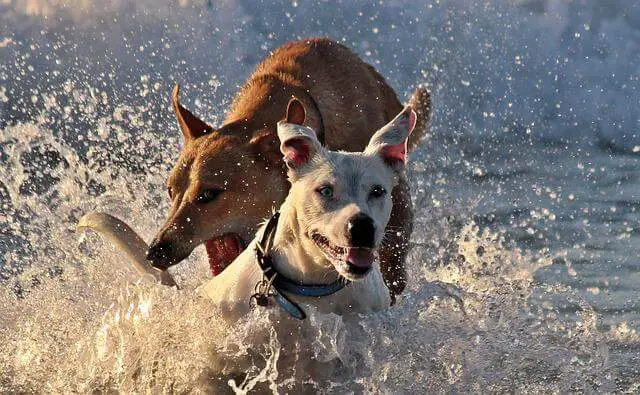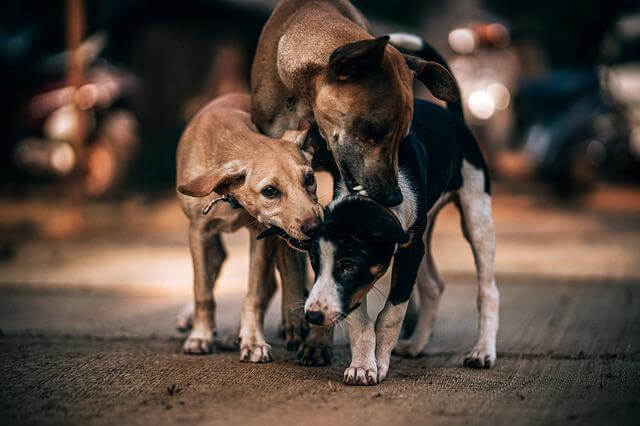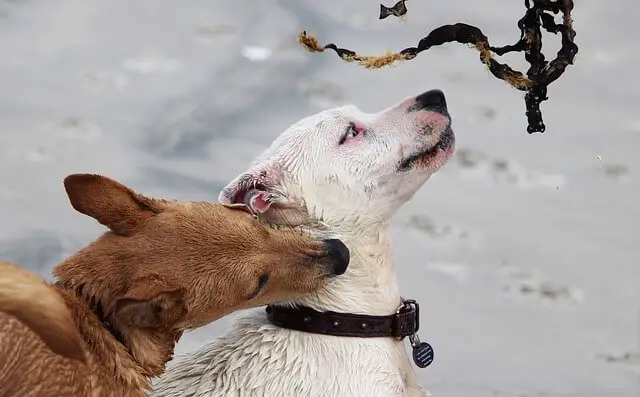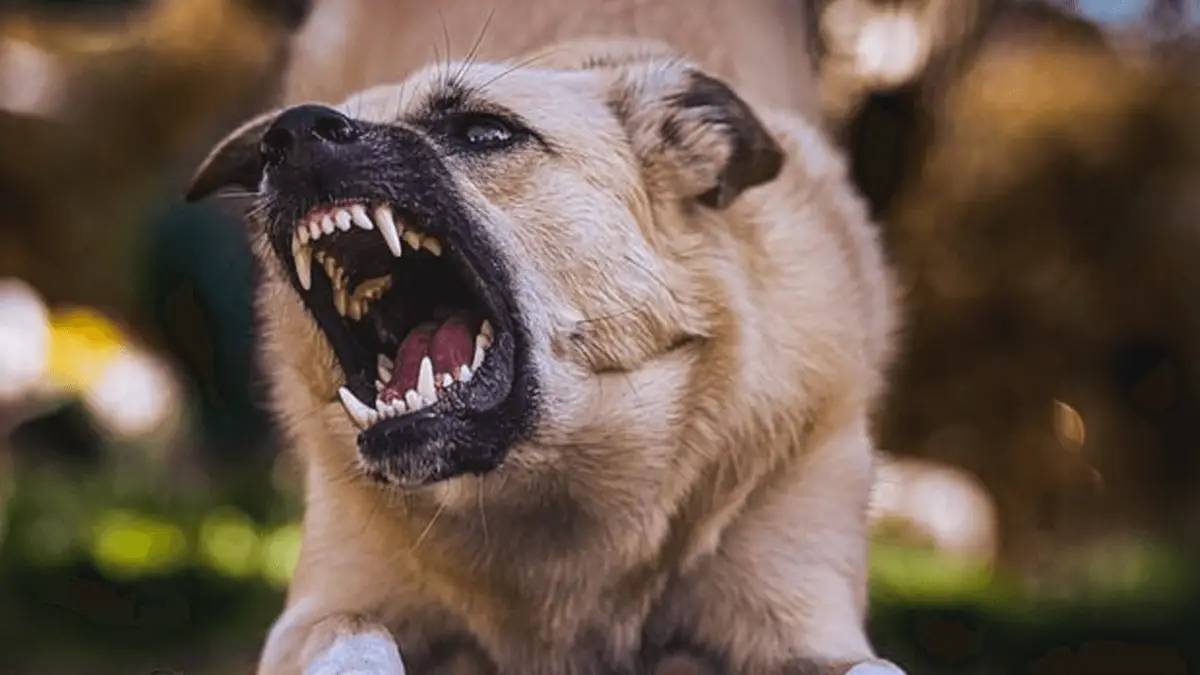Dog Bite Wounds? What To Do If Your Dog Get's Bitten?
25.05.2022.
One of the scariest things for dog owners is dog fights. Even more frightening is if your dog gets bitten and there is a wound you need to address. If that happens to you, you should know how to deal with it and prevent potential complications. Here's what you should know about bite wounds in dogs.
Why do dogs bite?
Biting is common in puppies that play a bit more aggressively. Biting and other aggressive behaviors in adult dogs can be motivated by various factors. Dogs can bite to express their feelings or deal with perceived threats. Aggressive behaviors like snarling, lunging, growling, snapping, or biting can be seen in dogs dealing with these issues. Biting can be a reaction toward another pack member, a battle for the owner's attention, resources, or a place in the pack.
How dangerous are dog bites?
Skin and soft tissue damage can be caused by dog bites. When a dog bites another dog, the severity will depend on the bite location. A bite can inflict serious or even fatal damage if it manages to tear skin and muscles, pierce the chest wall (which can cause the collapse of the lungs), or even perforate the intestines or internal organs. Soft tissues can be crushed or bruised even if the bite doesn't break the skin.

Bite wounds typically occur on the legs or around the neck and the dog's head. The esophagus (the tube that connects the stomach and the throat), the trachea (the windpipe), and major blood vessels are all vulnerable to bites in the neck. Eyes, ears, and the mouth can all be seriously injured by facial wounds. An injury to joints can occur when a dog gets bitten on the limbs.
Inside a dog's mouth is a breeding ground for bacteria, so bites that pierce the skin will most likely introduce bacteria into the bitten dog's system. They can easily spread throughout all body tissues. Consequently, all bite wounds that pierce the skin should be considered contaminated.
An untreated infection from a bite can lead to localized abscesses or more widespread cellulitis (a type of tissue infection) that can spread to other parts of the body. Septic arthritis (joint infection), osteomyelitis (bone infection), septic peritonitis (abdominal cavity pus), or pyothorax (chest cavity pus) can result from a piercing bite wound in some cases.
Do dogs need to see a vet if they get into a fight?
When a dog gets into a fight, determining the dog's injuries can be difficult, especially if the bite sites are in body areas with thick fur. Canine tooth punctures heal quickly, making them easy to overlook.

This is why it is important to see a veterinarian immediately if your dog gets bitten by another animal. If you can easily notice bite punctures, you should call your vet and schedule an appointment asap. Some wounds can appear minor but can actually be deep and life-threatening, depending on where they are located.
How can I recognize a severe wound?
Specific symptoms necessitate immediate veterinary attention. Symptoms that point to urgent vet attention are;
- Uncontrollable bleeding
- Weakness
- Breathing difficulty
- Limping
- Whining
- Gum discoloration
- Collapse
What kind of care will my dog receive?
Wounds' severity, your dog's overall health, and the wound location will all play a role in the type of treatment your veterinarian recommends. The ultimate treatment goal is to prevent further infections and complications. This will be done by cleaning the bite wounds, removing dead or harshly damaged body tissue, and, if possible, stitching the wounds.
For wounds that penetrate the skin, antibiotics may be administered. The vet's decision will depend on the wound location and the time between the bite and your vet's examination. Your vet may prescribe only a topical antibiotic. However, that is typically only in cases of minor injuries or open wounds that need to heal. A broad-spectrum antibiotic may be prescribed by your veterinarian if they believe bacteria have entered the dog's bloodstream. Antibiotics work best when started as soon as a bite injury occurs. After a bite, it is best to seek prompt veterinary attention.

Pain medication, sedation, or anesthetics should be administered to your dog before you begin the detailed examination of the extent of its wounds. As a final precaution, your veterinarian will remove any hair that may have accumulated around your pet's wounds to prevent further complications. A general anesthetic may be required for your dog in case of large wounds, highly contaminated, or in body areas that might be tricky for vets to examine (such as the mouth, ears, or eyes). This will allow the wound to be cleaned and treated safely and thoroughly. Non-steroidal anti-inflammatory drugs (NSAIDs), like meloxicam, deracoxib, or carprofen, will be prescribed to dogs for home administration.
It is common for vets to leave small wounds open to allow any infection to drain. There may be temporary drains if the extensive damage can cause fluid build-up in the bite area. Lacerations will be stitched up. Most wounds will be "debrided" (infected or compromised tissue will be removed, and the wound edges will be trimmed). Wounds on the skin may be widened to examine and clean the tissues beneath them.
A sensitivity test and bacterial culture should be carried out to identify the exact bacteria involved. That will tell the vet the best antibiotics for treating these bacteria. Even if bitten dogs don't show any improvement in their wounds after receiving broad-spectrum antibiotic treatment, your veterinarian may wait a few days before performing these tests.
What can I do at home to help my dog?
For dogs with sutures, the owner needs to keep the wound area sterile and dry. It is possible that your dog will need an Elizabethan collar (dog cone) or a bandage to cover the wound. Draining the wound is necessary if the vet left the wound open or if they placed a drain in the wound. Soft washcloths and warm water can be used to remove dirt and debris. A mild disinfectant cleaner may be prescribed by your veterinarian in some cases. Only use products that your veterinarian has prescribed. Hydrogen peroxide can be used for bite wound cleaning, but it is best to discuss it with your vet. This can delay healing and even worsen the situation if misused.
WARNING: If you've been told to clean the dog's bite wounds, make sure you're extremely cautious. Wound cleaning can hurt the dog, and your dog might bite you. Even the gentlest dogs can react to pain, so it is a good idea to muzzle them during the process.
Is there anything I can do to avoid my dog getting bitten?
You should never let your dog run loose in a park or anywhere else where it might be a danger to other people or animals. Obedience training should begin while they're still puppies because well-behaved dogs are less prone to fights. Approaching a free-roaming dog while out with your pet is not recommended. The other dog's temperament is unknown, and your dog's friendly and gentle temperament can get them into trouble.
To be completely safe, make sure your dog is vaccinated for rabies, and the vaccination is up to date.
World Dog Finder team







Share